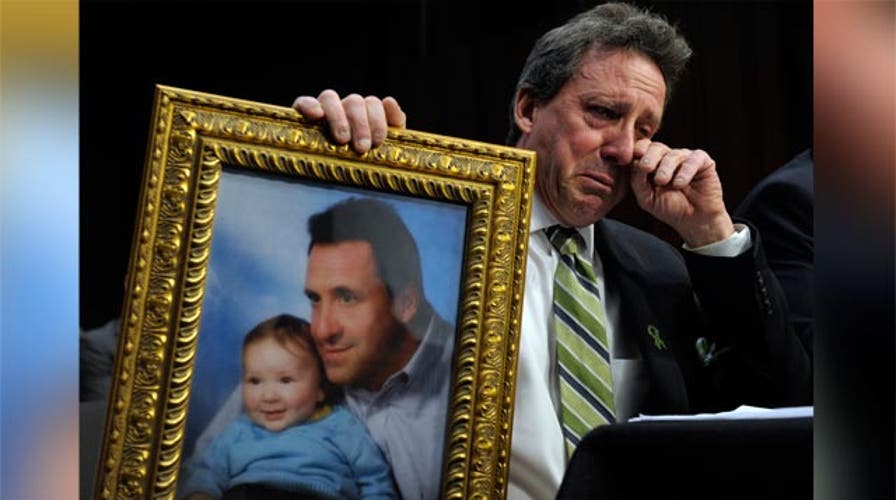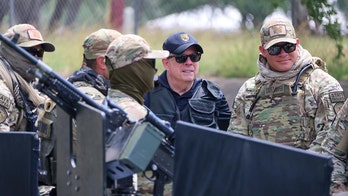Democrats have begun an all-out push to move a new assault weapons ban through Congress. But it faces strong headwinds from House Republicans, Democrats in pro-gun rights states and many legislatures in western and southern states who are moving in a different direction to ease gun control, rather than strengthen it.
The Senate Judiciary Committee, chaired by the bill's author, Democratic Sen. Dianne Feinstein, heard emotional testimony Wednesday from a witness list stacked with pro-ban speakers -- none more powerful than Neil Heslin of Newtown, Conn., whose son Jesse, was killed in the elementary school massacre. He pointed to his forehead and told the hushed hearing panel about the bullet that struck just below Jesse's hairline.
"Jesse looked at coward Adam Lanza in the eyes, saw his face and he looked at the end of that barrel, Jesse didn't run, Jesse didn’t turn his back. That was the fatal shot that killed Jesse," he said.
Democrats are pushing for a new gun ban that would limit, among other things, 157 types of so-called assault weapons and magazines that hold more than 10 rounds of ammunition. When asked if there is a constitutionally protected right for someone to own a gun with that kind of capacity to kill, John Walsh, the U.S. Attorney for the District of Colorado speaking on behalf of the Justice Department, said, "There clearly is room for reasonable regulation particularly of dangerous and unusual weapons."
That phrase, "dangerous and unusual weapons," is key to the Democrats' strategy of seeking a new ban that withstands court challenges. In the Supreme Court's Heller decision, which struck down the District of Columbia's handgun ban, Justice Antonin Scalia referenced a 1939 U.S. Supreme Court decision that gave Second Amendment protection to weapons "in common use at the time" of its being written.
Scalia wrote, "We think that limitation is fairly supported by the historical tradition of prohibiting the carrying of 'dangerous and unusual weapons.'"
Clearly, Democrats think that a magazine with more than 10 rounds, containing bullets that can do serious damage, qualifies as "dangerous and unusual."
But Republicans argue that those weapons are hardly unusual if in the possession of millions of Americans. There are presently more than 4 million AR 15's in American homes alone, and many more millions of excess-capacity magazines
Rather than create new laws that impinge on the Second Amendment, one Republicans asked why existing laws are not better enforced. Sen. Lindsey Graham, R-S.C., asked Walsh how many people who had failed gun background checks had been referred to state prosecutions.
Walsh said, "Senator, I don’t have a particular number on that."
Graham replied, using the most recent DOJ statistics. "Almost 80,000 people failed background checks and 44 people are prosecuted, what kind of deterrent is that?" he asked.
Republican Sen. Charles Grassley asked why a second assault weapons ban is needed, when a Justice Department study found the effects of the first ban to be inconclusive.
"They cannot clearly credit the ban with any of the nation's recent drop in gun violence," he said.
The push for a new assault weapons ban occurs as some states are jockeying to block a federal assault weapons ban -- while others are moving to enhance it.
In Illinois, the state legislature has begun a series of votes on a concealed-carry law, after an appeals court ruled the state ban on concealed weapons was unconstitutional. In South Dakota, the Senate has extended permits for concealed weapons from four to five years. In Texas, a new bill would protect state law officers from having to enforce a new federal gun ban.
One of its sponsors, Rep. Steve Toth, told Fox News, "Dozens and dozens of county sheriffs from around the state of Texas said we're not going to abide by this. This sets up a problem because if, in fact, this legislation does go through, they would be subject to prosecution by Eric Holder and the Justice Department -- so we've got to protect them."
But there are 23 other states that currently have an "assault weapons ban" or have similar legislation currently pending in their legislature.
The NRA's Jacqueline Otto tells Fox News, "This is very difficult to measure because anti-gun legislators are always trying to add anti-gun amendments to other pieces of legislation, so bill descriptions are changing constantly." She added, "Some states that currently have an assault weapons ban are introducing more firearms to be included in their lists of assault weapons by changing the definition of assault weapon."
Those states include California, Connecticut, Massachusetts, Maryland, Ohio, Pennsylvania, Vermont and Washington.





